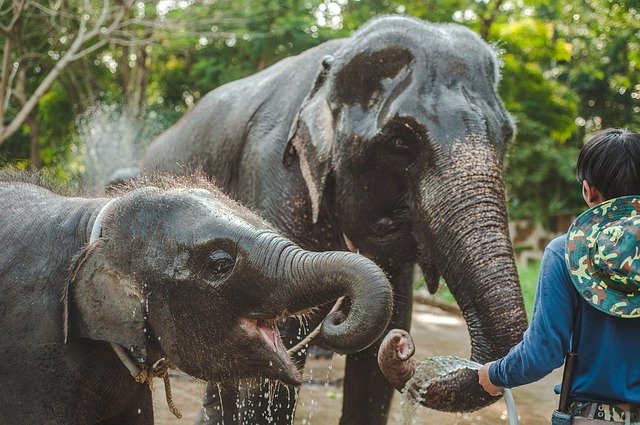Being a Mahout for a Day in Chiang Mai

I was on a photography tour in Thailand when we were taken to an elephant farm. The day started with a lecture about elephant conservation, and some information about elephant behavior. We were told that Asian elephants can live 40 to 50 years, African elephants even longer. They have excellent memories, and it’s said an elephant will remember you, even if they haven’t seen you for years.
We were going to be mahouts for ta day in Chiang Mai, and the leader outlined what our day as a mahout would be like. After each of us was introduced to our elephant, the real mahouts told us that the first thing they do every morning is a health check. We needed to check there was dirt on both sides of our elephant’s torso. They are so heavy that an elephant can fracture a rib just by sleeping on one side all night without turning over. They usually sleep about three hours, then turn over and sleep another three hours. It takes a lot of energy to turn over, or to get up, so if they do not feel well they may not do so and would only have dirt on one side.
We were also taught to inspect their poop, which should be moist and in 4-5 inch-diameter balls. Transit through the elephant’s digestive system takes about six hours from mouth to rectum. If things are not working properly, food may take longer to transit and more water is absorbed from it in the colon, so the poop will be dry. Fluid should be able to be squeezed out of healthy poop. We checked the eyes and mouth for signs of dryness, excessive tearing and bad or broken teeth.
We were given buckets of bananas, and initially I fed Ma-Long a couple at a time, but the mahout told me to give her a bunch of six or eight at one time. We fed them before and after we brushed them with stiff brushes, and also after we bathed them.
The elephants got their own back by showering us, squirting water with their trunks as we were showering them, and it turned into a fun water fight.
After there was no more dirt on their sides we changed into swimsuits while they munched on more bananas. Then we led them down a steep path to the river where we were all immersed. We brushed every part of the elephants’ bodies and ensured they were clean. They seemed to enjoy their massage. We even mounted their backs while they were in the water up to their necks, to ensure we got them clean. The river had been dammed to provide deeper water in a pool. Then we were instructed to line them up where it was very shallow and throw buckets of water on them. The elephants got their own back by showering us, squirting water with their trunks as we were showering them, and it turned into a fun water fight.
We led our elephants back up the hill, and one-by-one mounted them, riding individually on their bare necks, which does not hurt them. Each elephant had a distinct personality and a preferred way for their rider to mount. One liked their mahout to leap up while facing them, and they would help by lifting the rider onto their back. Another would step onto the trunk and the elephant would do most of the work of lifting them 10 feet up. I had had a hip replacement earlier in the year and was unable to leap. They paired me with the old lady of the troop, who kindly lay down for me and I was able to clamber up and take my place on her neck.
Ma-Long and I were one of the last pairs to be mounted, and we followed the others up the steep hill. We were instructed to lean forward when going up hill, and backwards when going downhill. Each elephant had a strap around their abdomen, which we could hold onto at the back if we wished, but as they said, “a 10-ton elephant who never has more than one of its huge feet off the ground at anyone time is much more stable than a human with only one foot on the ground when climbing or descending a hill.”
The elephants knew the way and we did not have to direct them. We kept our knees bent and almost looked like jockeys as we set off. On the second hill after a brief dip, Ma-Long must have felt the others were going too slowly. She picked up speed, and one-by-one I waved to my companions as she overtook them. As we started down on the trail through the forest, she was in the lead and obviously happy to be so. Ma-Long lumbered along at quite a pace, those eight-foot-long legs striding out. Five minutes later, we left the troop and our mahout behind and didn’t see them for nearly 30 minutes, as we passed through the forest along the undulating trail. They finally caught up with us at the lunch spot, after we had had to cross a main road. There was no crossing guard, but the one car who was approaching could see us and waited until we had crossed safely. I stayed on her neck as Ma-Long munched on bamboo growing near our lunch spot, waiting for the others to catch us up.
We were able to climb off onto a bench built around a tree, to assist with mounting and climbing down. I hadn’t wanted to attempt it with no one in sight and was completely at ease on Ma-Long’s neck. We were a good team.
Our delicious vegetarian lunch was set out under the shade of some trees: fresh pineapple, papaya and other locally grown fruits and vegetables, with a spicy rice risotto-like dish and saffron rice. There were no seats. We had to kneel as the food was served on a cloth on the ground.
After lunch our mahouts, who ate separately, took us to see the baby elephants. One was only three hours old, hiding out under his mother most of the time, and a little wobbly on his legs.
We mounted with assistance and our mahouts came with us for the afternoon ride – much of which was along a river bed. I would have hated walking on the pebbles on the bottom but the elephants didn’t seem to mind, and we were told that a daily walk of 30 minutes along the river bed kept their toenails trimmed. At one stage, I was surprised as I ducked to avoid crashing into an overhanging branch, and I felt a thump behind me. It was my mahout leaping on to Ma-Long’s back, since the trees and dense brush on the river banks meant there was no path for him to walk on. Once grass appeared, he leaped off again, only to repeat the exercise 10 minutes later. This time I was not surprised. When we came out of the river and climbed the bank to make our way along the perimeter of a field, Ma-Long was happy to find lots of bamboo, which she tore off in sizable chunks and broke down as she stuffed it into her mouth with her muscular trunk. She reminded me of a pre-teen boy who thought he was starving and kept stuffing food into an already-full mouth! I didn’t think she would understand me if I reminded her not to eat with her mouth full.
Ma-Long’s competitive spirit of the morning had left her as the others overtook us while she ate voraciously. I think we were last at the finish line. Our memorable day as mahouts ended. I was sad to leave Ma-Long with the other elephants while my group returned to Chiang Mai by bus.








